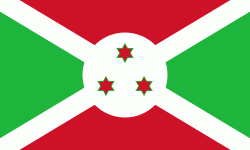Flag of Burundi
The original national flag of Burundi (Kirundi: ibendera ry'Uburundi) was adopted after the country's independence from Belgium on 1 July 1962. It went through several revisions and now consists of a white saltire which divides the field into alternating red and green areas. The center of the saltire merges into a white disk, on which there are three red solid six-pointed stars outlined in green. The current ratio is 3:5, which was changed from 2:3 on 27 September 1982.
The flag is divided into four parts by a white saltire. The upper and lower parts are red in color, while the left and right ones are green in color. The white color of the saltire represents peace, green represents the nation's hopes placed on future development, and red symbolizes the suffering of the nation during its freedom struggle. The three stars in triangular configuration stand for the three ethnic groups of Burundi: the Hutu, the Twa and the Tutsi. The three stars also stand for the three elements of the national motto: Unité, Travail, Progrès ("Unity, Work and Progress"), which can be seen on the coat of arms of Burundi. They also represent the loyalty that the citizens of the nation have pledged to their God, king and country.
The flag is divided into four parts by a white saltire. The upper and lower parts are red in color, while the left and right ones are green in color. The white color of the saltire represents peace, green represents the nation's hopes placed on future development, and red symbolizes the suffering of the nation during its freedom struggle. The three stars in triangular configuration stand for the three ethnic groups of Burundi: the Hutu, the Twa and the Tutsi. The three stars also stand for the three elements of the national motto: Unité, Travail, Progrès ("Unity, Work and Progress"), which can be seen on the coat of arms of Burundi. They also represent the loyalty that the citizens of the nation have pledged to their God, king and country.
National flag
Country - Burundi
Warning: getimagesize(/Image/Map/MP433561.gif): failed to open stream: No such file or directory in /home/mapnlee7/public_html/MAPNALL/article.php on line 532
 |
 |
The Twa, Hutu and Tutsi peoples have lived in Burundi for at least 500 years. For more than 200 of those years, Burundi was an independent kingdom, until the beginning of the 20th century, when it became a German colony. After the First World War and Germany's defeat, the League of Nations "mandated" the territory to Belgium. After the Second World War, this transformed into a United Nations Trust Territory. Both Germans and Belgians ruled Burundi and Rwanda as a European colony known as Ruanda-Urundi. Burundi and Rwanda had never been under common rule until the time of European colonization of Africa.
